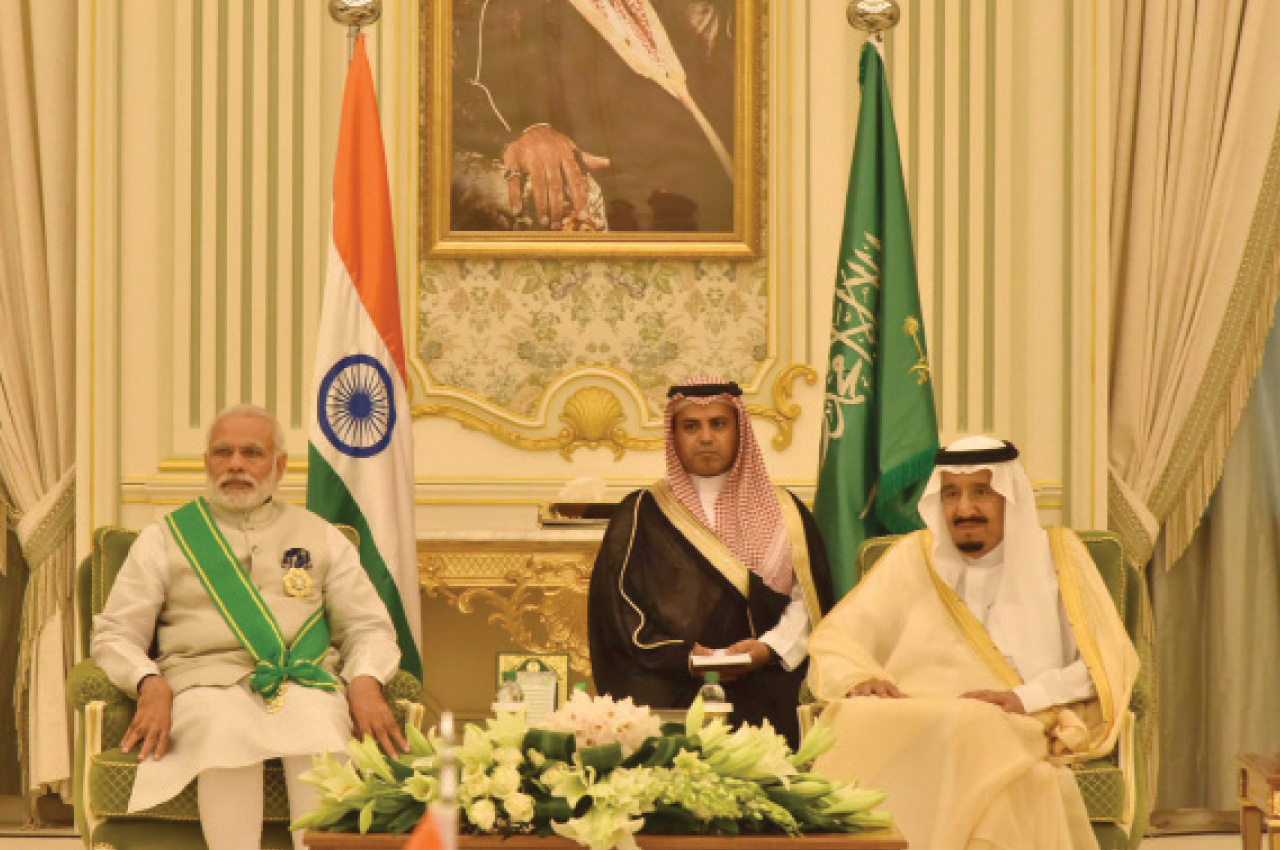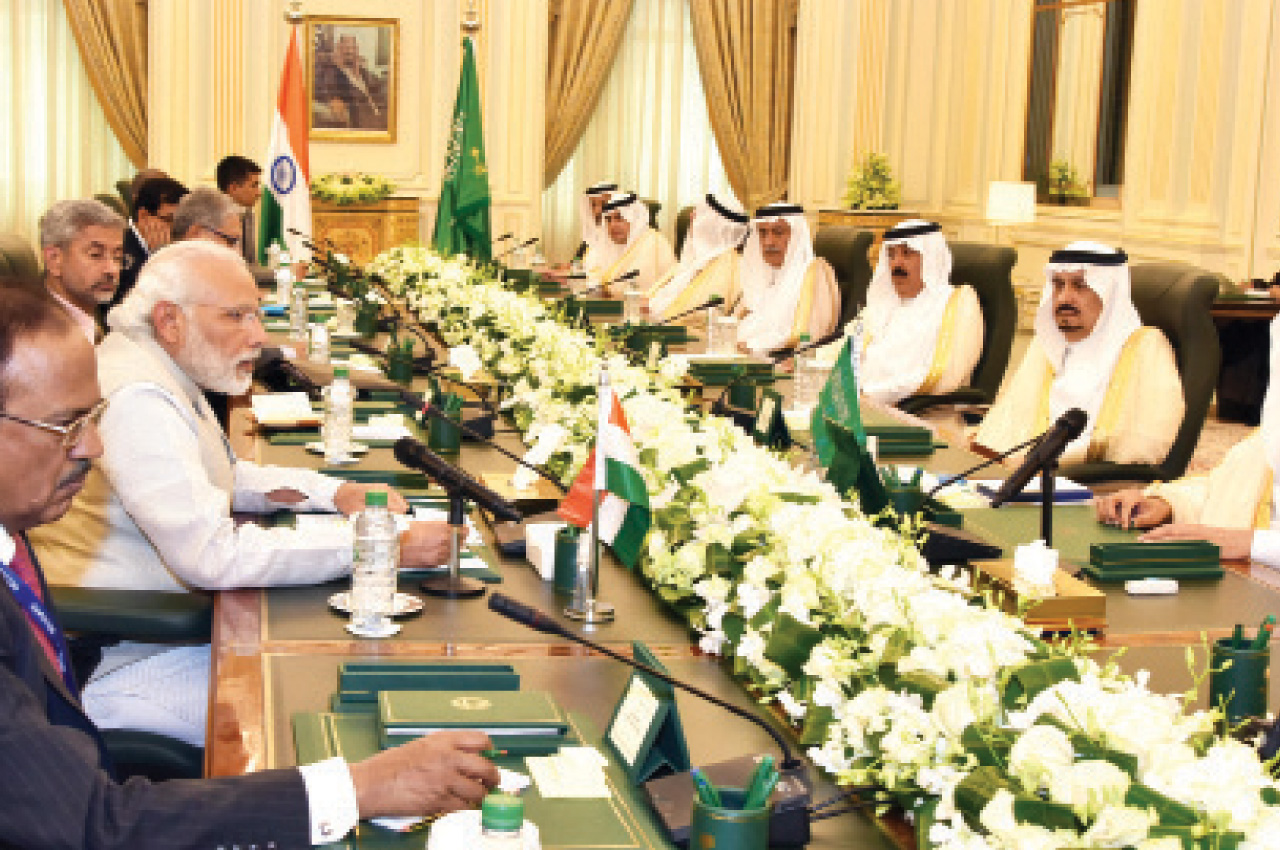Dr Vinita Singh Chhetri
 The Kingdom of Saudi Arabia and Republic of India share a heritage that dates back to several millennia. Over the years, the scholastic, cultural exchanges and religious ties were established which remain vibrant even today. As the twentieth century was drawing to a close, new windows of opportunities for better relations once again loomed. The end of the Cold War and India’s economic liberalization in the 1990s led to India’s greater engagement with the Gulf. With the passage of time, the two countries evolved their engagements into a more nuanced and diversified areas such as trade and investment, migration, defence and capacity building and also increased co-operation in harmonization and mutual recognition of standards, trade documentation, and certification to promote streamlined movement of goods and services.
The Kingdom of Saudi Arabia and Republic of India share a heritage that dates back to several millennia. Over the years, the scholastic, cultural exchanges and religious ties were established which remain vibrant even today. As the twentieth century was drawing to a close, new windows of opportunities for better relations once again loomed. The end of the Cold War and India’s economic liberalization in the 1990s led to India’s greater engagement with the Gulf. With the passage of time, the two countries evolved their engagements into a more nuanced and diversified areas such as trade and investment, migration, defence and capacity building and also increased co-operation in harmonization and mutual recognition of standards, trade documentation, and certification to promote streamlined movement of goods and services.
International relations theorists argue that if a country becomes an economic power, its national interests widen. This compels it to develop and increase its diplomatic and military capabilities, and to build up alliances in order to maintain its national interests. Saudi Arabia is a leading country in the Arab and Islamic world, with considerable ideological, political and financial clout. India on the other hand, is a growing economy and its large Muslim population has created space for economic, cultural and strategic complementarities between both states. Regional changes have also facilitated a mutual desire in both countries to not let their bilateral relations be limited only to foreign policy imperatives; as strengthening India- Saudi Arabia ties are also vital for both countries when viewed through the prism of their geo- political considerations.
 Ever since India and Saudi Arabia have established the Joint Commission for Economic, Trade, Scientific, Technical and Cultural Cooperation (JCM) in 1981, the two countries remained actively engaged in the fields of science and technology and agriculture. The relations between India and Saudi Arabia were galvanized by the visit of the Saudi King Abdullah in 2006. This visit not only filled the void of more than five decades of political exchanges at the highest level but also prepared a ground for building a broad-based relationship, which suited their national interests in the changed regional and global order. The two documents Delhi Declaration (2006) and the Riyadh Declaration (2010) signed in the respective capitals, carry the blue prints of mutual urge of deepening and expanding their cooperation in the 21st century. Through the Delhi Declaration, closer cooperation is being sought to encourage entrepreneurs, technology, agriculture, bio-technology and renewable energies in both states. In the Riyadh Declaration, both India and Saudi Arabia expressed mutual desire to develop knowledge based economies based on advances in the areas of information technology, space science and other frontier technologies.
Ever since India and Saudi Arabia have established the Joint Commission for Economic, Trade, Scientific, Technical and Cultural Cooperation (JCM) in 1981, the two countries remained actively engaged in the fields of science and technology and agriculture. The relations between India and Saudi Arabia were galvanized by the visit of the Saudi King Abdullah in 2006. This visit not only filled the void of more than five decades of political exchanges at the highest level but also prepared a ground for building a broad-based relationship, which suited their national interests in the changed regional and global order. The two documents Delhi Declaration (2006) and the Riyadh Declaration (2010) signed in the respective capitals, carry the blue prints of mutual urge of deepening and expanding their cooperation in the 21st century. Through the Delhi Declaration, closer cooperation is being sought to encourage entrepreneurs, technology, agriculture, bio-technology and renewable energies in both states. In the Riyadh Declaration, both India and Saudi Arabia expressed mutual desire to develop knowledge based economies based on advances in the areas of information technology, space science and other frontier technologies.
Recently, Prime Minister Narendra Modi’s two-day State visit to Saudi Arabia on April 2-3, 2016 further bolstered India’s engagement with the Kingdom. Modi’s visit brought the India-Saudi relationship further closer from where it stood when the Delhi Declaration of 2006 and Riyadh Declaration of 2010 were issued. Modi’s visit, while intending to take the relationship to a new level, has laid emphasis on important issues such as trade, investment, terrorism and strengthening strategic ties. Saudi Minister for Foreign Affairs Adel bin Ahmed Al Jubeir, while visiting India on March 7 to 8, 2016, had stated that India is a “very important partner” for Saudi Arabia and expressed his desire to broaden bilateral engagement. Modi, during his visit to Riyadh, encouraged more investments from Saudi Arabia into India. According to the Sovereign Wealth Fund Institute (SWFI), Saudi Arabia holds the world’s fourth largest sovereign wealth fund with the present holding standing at $632.3 billion. India intends to tap into this huge fund by inviting investments from the Kingdom. Both sides signed an agreement to promote investment and Saudi Arabia has shown interest in investing in India’s infrastructure sector. During the last decade, there is an evident shift in India’s approach. India has been trying to move beyond the buyer-seller relationship in the energy sector and laying emphasis on strengthening cooperation in political, security and defence matters. While recent achievements in security and intelligence cooperation have been remarkable, new vistas are also being explored to further strengthen the relationship. Modi’s visit is a reflection of changing India-Saudi Arabia relations.
The two countries are now cooperating to face common strategic challenges arising from terrorism, transnational crime and extremism, in addition to promoting peace and stability in their respective regions. This is especially so in light of the fact that Gulf security and security of the Indian Ocean are closely interlinked. India is becoming more reliant on oil imported from the Gulf region as its economy continues to grow rapidly. Improvement in India’s relations with Saudi Arabia has helped the former to contribute significantly towards Gulf security. This would stimulate military and political cooperation between Saudi Arabia and India. As a result, it has been emphasized that both countries retain mutual geo-strategic imperatives, necessitating the growing warmth in their relations. To this extent, security will ultimately be the bedrock on which India-Saudi relations will prosper. This means that the real challenge facing them is how to work out a formula for robust cooperation on acute political and security issues which will take bilateral ties beyond its traditional fundamentals of trade, oil and labour. In the long run, India will continue to remain an important partner for Saudi Arabia and vice versa. The present level of cooperation between the two countries is beyond the actual potential. Both sides will need to work hard if they are to strengthen the present level of ties which is not comprehensive in nature, so as to gain strategic character. This partnership will enable both countries to harness the vast potential of bilateral relations, and address regional and global challenges.








